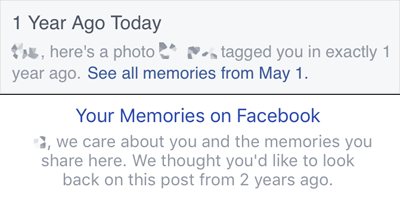A More Compassionate Facebook
Published 9 years, 8 months pastIt’s been a busy couple of weeks for Facebook, in terms of compassionate design decisions.
First they announced that they aren’t adding a Dislike button, but they are adding a set of six emoji reactions to the “Like” button, so you can indicate a wider range of emotion. Some people immediately linked this to Slack, as if emoji reactions hadn’t been a thing on social media for the last couple of years. I happened to see Sally Herships asking “what are your thoughts?” about it on Twitter (heh), and oh, I had thoughts. I ended up sharing some of those thoughts by phone, and one of them was part of a segment on American Public Media’s Marketplace.

It’s funny, in a way, that my thought on marketing and advertisers was what made it into the piece, because I think that was literally my whole thought about that side of things. Most of the rest of my conversation with Sally was about how Facebook could use these reactions as a way to avoid insensitive design choices. As an example, a status update that gets lots of interaction in the frowny-face or sad-face realm could be avoided when it comes to things like Year in Review. I said something to the effect of:
People are sharing everything about their lives, positive and negative, billions of us every day. That isn’t going to stop, so it’s great to see Facebook making changes to meet us where we are, or at least meet us partway.
These reaction emoji almost certainly aren’t the last word on this, but they’re a credible initial attempt. In more than one sense, they’re a first step into a larger world.
Next, Facebook introduced filtering for its On This Day (OTD) feature. This is another step in the evolution of On This Day, one that’s very welcome. Facebook had already been revising its language to be more humane, shifting from simple “Relive this memory” to nuanced language expressing care and openness.

With its new OTD preferences, Facebook now lets you define ranges of dates you’d like to be blacklisted, in effect, as well as people you don’t want to see memories about. I’d commented on the lack of this, back when OTD launched:
…what I notice here is what’s missing: I don’t see any reference to an ability to opt out of On This Day, either for certain days or altogether.
So far as I can tell, you still can’t opt out entirely; even if you turn off all notifications, you can still get memories inserted into your timeline. For me, I see about one a month, more or less. But here’s the interesting thing: they’re almost never my memories. In what I still regard as a major gamble by Facebook, On This Day will show you posts, pictures, and videos posted by someone else, but on which you were tagged. I presume (though I have no simple way to test) that adding a person in the OTD filtering preferences will prevent you from seeing memories in which they’re tagged as well as memories they posted.
If so, that’s a really smart step, as I can only imagine how a spiteful ex might abuse OTD. It still leaves open the possibility of old posts that you don’t remember being tagged on suddenly appearing. In many cases, that will be a delightful moment, but in many others, the exact opposite of that. This is why I regard Facebook’s decision to show you posts from other people a gamble. Even if they show unwanted memories to just 1% of their user base — a ridiculously low percentage — that’s literally 10 million people a day.
Still: wrinkles or no, flaws or no, the presence of filtering preferences is a major enhancement to On This Day. I could block out all of June 2014, if I so chose. There might be years where I blocked it, and others where I removed the block. The important thing is that I’m being given that capability, in an environment that’s already designed to show me memories and acknowledge that it’s easy to get that wrong. The user experience for adding filters is still clunky, but much like the reaction emoji, I view this as a credible first try, not the final word.
All this has made for some interesting Slack discussions between me and Sara, as we literally just finished the manuscript for our forthcoming, still-not-quite-titled-but-we’re-really-close-honest book on compassion in design. Which has references to things like On This Day, so we’re already revising a book that hasn’t even been published yet. And when will it be published? We’re pulling for early next year, which sounds like a long way away until you remember that 2015 is getting close to done.
Kudos to Facebook, both for its efforts to be kinder in what they do and for its willingness to try. Not many businesses, let alone social-media titans, have had the courage to think about what can go wrong in this realm, let alone actually acknowledge missteps and work to do better. Well done.
Comments (2)
I personally feel that the OTD is a bit of a ‘liberty’ I’ve seen a lot of the memories hit my timeline and am a little peeved about all the memories that what you don’t want to see come flooding in.
I think it’s a great feature, my daughter loves it. However not one that I feel comfortable with when I have no control over who’s seeing my history.
I do admire FB for pushing ever forward, just wished their ‘think group’ were a little more considerate.
I love that there is a wider pool of expression emojis to choose from. It’s hard enough trying to express emotion on a computer via typing, especially when we are already missing personal interaction from face to face meetings when interacting on Facebook. It’s so easy to be misinterpreted on Facebook.